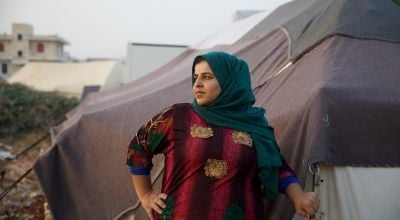
Knowledge Hub
Diagnosed with cancer – then my hospital was bombed

Living with cancer is frightening wherever you are. But what if your hospital was hit by missiles? What if you had to move away from your child? For Rabia, a refugee from the Syria crisis, sewing workshops are an emotional lifeline.
Rabia was born in Lebanon but spent most of her adult life in Syria, after marrying a Syrian man. She has two children, aged 13 and 17. She returned to Lebanon with her youngest son 18 months ago, after being diagnosed with cancer. The pair live with another family in a ground-floor apartment in Tripoli.
“I was getting good treatment in Syria,” Rabia explains. “But the war stopped all that. The hospital where I was being seen was hit by missiles. So many doctors have fled Syria. I came to Lebanon to try and get treatment.”
She’s joined embroidery workshops funded by Concern. Women can sell what they stitch, earning a small but vital income. But they can also let off steam, swap advice and help each other through an incredibly tough time.
She tries hard to keep strong
One of Rabia’s friends at the classes, Samira, explains why Rabia is so popular there.
We love her because, even though she has many problems, she tries hard to keep strong for her family and friends. Every day, we see the real effort it takes her simply to get to the classes as she comes on crutches and struggles to get up the stairs. But she is always laughing and makes light of the pain she’s in. She has been through so much, but she keeps on going.

Rabia’s husband left her after she was diagnosed with cancer and has since remarried. As a single parent, Rabia has struggled to find the money to pay her medical bills in Lebanon. Basmeh and Zeitooneh, the organisation that runs the sewing workshops, have paid for her recent hospital visits as she waits for news about her condition.
Her son’s school was bombed
“I just wish I could gather my sons around me,” says Rabia, her eyes filling with tears. “Earlier this week, we heard that my oldest son’s school in Syria had been bombed. When he called to tell me he was still alive, I could not stop crying. He is desperate to get out of the country but I am worried he could be abducted if he tries to leave. I just don’t know what to do. I long for us to be together.”
“My youngest son has lost his confidence since coming to Lebanon. He has no friends and has had to give up school. He is a clever boy but found it difficult attending classes where he did not understand the language they were speaking. He helps me as much as he can but struggles to keep going when he thinks about home. Whenever we hear bad news from Syria, he cries for his brother.”

Sewing classes are like a second home
What keeps me going is the sewing classes. Day after day, I love coming here more and more, it’s like my second home. The women here are going through the same pain. We have our problems, of course, but we are all of one heart.






